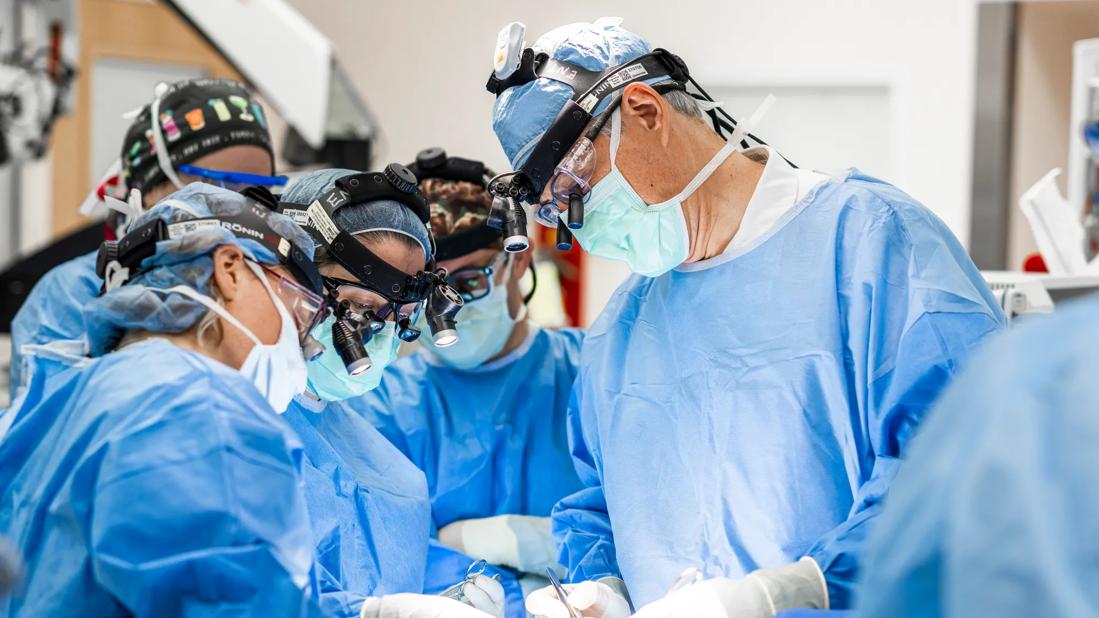Giving patients another chance at life

The demand for organ transplants in the U.S. is high with more than 100,000 people awaiting donors, according to the Organ Procurement and Transplantation Network. Thus, the transplant nursing specialty continues to be a growing career option within the nursing profession.
Advertisement
Cleveland Clinic is a non-profit academic medical center. Advertising on our site helps support our mission. We do not endorse non-Cleveland Clinic products or services. Policy
Caterine Osgood, MSN, RN, CNOR, is Assistant Nurse Manager (ANM) for Abdominal Transplant, Urology and Robotics within Cleveland Clinic Florida’s Department of Surgical Services and she says transplant nursing is also a highly rewarding career choice.
In one simple statement, she expresses what makes being a transplant nurse so special: “As a transplant nurse, you are part of the process of giving the gift of life.”
Transplant nurses provide care to patients who are receiving or donating organs, assisting in every phase of organ and tissue donation. As part of their responsibilities, transplant nurses prepare patients for the transplant process, providing education on the procedure, expected recovery and associated risks. They assist with pre-surgical care, operating room preparations and care during the procedure, as well as post-operative care, including monitoring for complications or organ rejection. They also assist with deceased donors by monitoring and preparing the donor’s body for surgery.
Transplant nurses may work in hospitals, ambulatory surgery centers and specialized organ transplant facilities.
From the surgical nursing transplant side of the job, Osgood says her team consists of all members of the surgical nursing general staff. Each nurse is extensively trained to perform kidney transplants, which Osgood notes as the most straight-forward of transplantation procedures. However, her department also has exclusive caregiver teams for complex procedures like heart or liver transplants. Currently, the liver transplant team encompasses 7 nurses and 6 surgical technologists, and the heart transplant team has 5 dedicated nurses and 4 surgical technologists.
Advertisement
She says, most commonly, her team cares for patients who have end-stage kidney failure secondary to diabetes and hypertension, liver failure due to non-alcoholic steatohepatitis (NASH), hepatitis C and alcoholic cirrhosis, and heart failure.
Osgood notes that the surgical aspect of organ transplantation is a destination that requires the completion of many processes, which are taken care of by the entire clinical transplant team at Cleveland Clinic Florida.
“Without our combined efforts and teamwork, our nurses would not be able to provide the highly specialized care our patients need,” Osgood comments. “I think that our efforts as a united surgical team is what gives our patients that second chance at life and that’s what I love most about what we do.”
To become a transplant nurse, as with other nursing careers, one needs thorough and comprehensive training and education. Transplant nurses must become a licensed registered nurse with either an associate’s or bachelor’s degree in nursing. It is important to have clinical study and experience in medical-surgical nursing and critical-care/intensive care nursing.
Specific transplant training varies per each healthcare organization, but as a general rule of thumb, registered nurses interested in transplant nursing should plan to obtain at least two years of related experience, including one year of direct involvement in the care of organ transplant patients. Many organizations also require transplant nurses to become certified as a Certified Clinical Transplant Nurse by taking the certification exam offered by the American Board for Transplant Certification.
Advertisement
In Osgood’s case, she has been a member of the Cleveland Clinic Florida surgical transplant team as a circulating nurse for more than 6 years.
“When I first started my nursing career, as a young and impressionable nurse, the complexity of transplant patients and cases drew me to them,” Osgood comments. “I would help the team get ready and observe as much as I could. Soon, an opportunity presented itself for me to join the team and train further, so I took it.”
Osgood later accepted a position as the ANM for Urology, Gynecology and Robotics Surgical Services, and for the past 1.5 years has served as ANM for Abdominal Transplant, along with Urology and Robotics Surgical Services.
In her current role, she performs the traditional duties of a circulating nurse, with the added management responsibilities of maintaining specially needed supplies, surgical instrumentation, equipment, and surgeon needs. She also helps maintain team cohesiveness and communication, provides training when necessary, and ensures both personal and professional support whenever and wherever it’s needed.
From a patient care perspective, Osgood says safety is always a top priority and having the ability to advocate for those who are unable to do so themselves makes the work of transplant nurses extremely meaningful.
“As a transplant nurse there’s this incredible realization that our patients have come to us for another chance at life – and we are there to help them through that journey as safely as possible,” she says.
Advertisement
Happy Year of the Nurse to all transplant nurses!
Advertisement
Advertisement

Planning continues with critical, patient-focused input from nursing teams

Strengthening care through targeted resources and frontline voices

Embracing generational differences to create strong nursing teams

CRNA careers offer challenge and reward

An unexpected health scare provides a potent reminder of what patients need most from their caregivers

Cleveland Clinic Abu Dhabi initiative reduces ICU admissions and strengthens caregiver collaboration

Veteran nurse blends compassion, cutting-edge transplant training and military tradition to elevate patient care

Embrace coaching and other tips to be a stronger leader